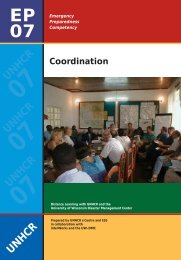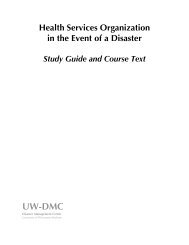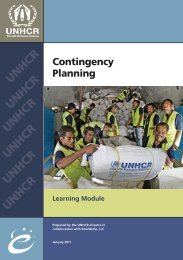Managing External Relations - Disaster Management Center ...
Managing External Relations - Disaster Management Center ...
Managing External Relations - Disaster Management Center ...
Create successful ePaper yourself
Turn your PDF publications into a flip-book with our unique Google optimized e-Paper software.
EP<br />
04<br />
■<br />
70<br />
<strong>Managing</strong> <strong>External</strong> <strong>Relations</strong><br />
Activities and Methods to Build Donor <strong>Relations</strong><br />
Developing a donor relations strategy including preparing briefings and<br />
involving donors in fundraising activities and in missions to see refugee sites.<br />
Promoting funding for approved budgets.<br />
Supplying Funding and Donor <strong>Relations</strong> Services (FDRS) with information from the field<br />
for preparing appeals and reports on the use of funds.<br />
<strong>Relations</strong>hips with Donors and Funding Agencies<br />
UNHCR provides assistance to refugees through two types of programs—General and Special—<br />
both of which depend on voluntary contributions. UNHCR’s financial requirements for the General<br />
Programmes are submitted in November each year to a Pledging Conference by the UN Secretary<br />
General. This is an occasion where many Governments announce their basic core contribution to<br />
UNHCR. However, the conference tends to cover only 25-30% of the General Programme requirements<br />
for the following year. Appeals for Special Programmes are issued regularly throughout the<br />
year. Whenever possible, UNHCR participates in Consolidated Inter-Agency Appeals.<br />
Donors and Funding Agencies<br />
While UNHCR receives some international assistance from private individuals and organisations,<br />
the majority is provided through donor governments. Some donor government resources may be<br />
provided multilaterally, or through the UN system, while others are channelled bilaterally, or directly<br />
from the donor to the recipient government. Almost all donor governments involved in international<br />
relief operations have embassy representatives in the countries where<br />
UNHCR is present and usually have specialists who focus on relief efforts. Discussions with<br />
donors in the field may occur through meetings with the UNHCR Representative and through visits<br />
by donor representatives to field sites. In addition, the Resident/Humanitarian Coordinator may<br />
arrange meetings between major donors and the UN agencies as a group. Donors may also form<br />
co-ordination bodies for their mutual benefit in an emergency. One such case was the Somalia Aid<br />
Co-ordination Body consisting of representatives from major donor countries and UN agencies that<br />
operated during and even after the emergency.<br />
UNHCR FDRS Staff and Focal Points<br />
Along with the PSFR and Public Information (PI) services, UNHCR is also involved with fundraising<br />
activities. UNHCR’s Funding and Donor <strong>Relations</strong> Services (FDRS) is a specialised department that<br />
offers a window through which donors can look at UNHCR, its mandates, policies and operations.<br />
FDRS uses its relationships with donors to promote UNHCR in general terms and to negotiate<br />
funding. FDRS in Geneva establishes strategies for funding on the basis of global and programme<br />
needs. Because of the requirements imposed by various donors and the sensitive nature of donor<br />
relations, it is important that the FDRS funding strategy and FDRS guidelines are honoured by UNHCR<br />
offices and operations in the field. FDRS relies on information from the field on protection and<br />
services and field-generated appeals—these have proved to be the most effective fundraising<br />
devices. Field staff should keep FDRS informed about the results of discussions with donors.<br />
For all major operations, UNHCR assigns focal points among its field staff for action and follow-up<br />
on fundraising issues. Their task is not to negotiate contributions—with very few exceptions for








